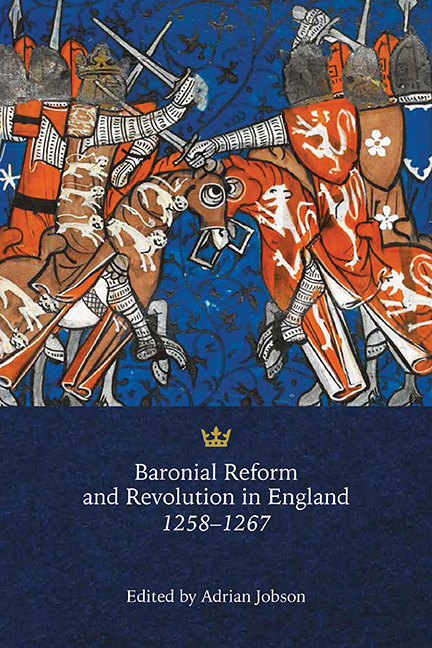Book contents
- Frontmatter
- Dedication
- Contents
- List of Illustrations
- Acknowledgements
- List of Abbreviations
- Introduction
- Modern Historians and the Period of Reform and Rebellion, 1258–1265
- The Secret Revolution of 1258
- Baronial Reform, the Justiciar’s Court and Commercial Legislation: The Case of Grimsby
- Crisis Management: Baronial Reform at the Exchequer
- Local Administration during the Period of Reform and Rebellion
- What Happened in 1261?
- Writing Reform and Rebellion
- Civic Government in Troubled Times: London c.1263–1270
- The Montfortian Bishops
- Reformers and Royalists: Aristocratic Women in Politics, 1258–1267
- The Midlands Knights and the Barons’ War: The Warwickshire Evidence
- Retinues, Agents and Garrisons during the Barons’ Wars
- The Barons’ War in the North of England, 1264–1265
- The Maritime Theatre, 1258–1267
- Reasserting Medieval Kingship: King Henry III and the Dictum of Kenilworth
- Index
Civic Government in Troubled Times: London c.1263–1270
Published online by Cambridge University Press: 21 May 2021
- Frontmatter
- Dedication
- Contents
- List of Illustrations
- Acknowledgements
- List of Abbreviations
- Introduction
- Modern Historians and the Period of Reform and Rebellion, 1258–1265
- The Secret Revolution of 1258
- Baronial Reform, the Justiciar’s Court and Commercial Legislation: The Case of Grimsby
- Crisis Management: Baronial Reform at the Exchequer
- Local Administration during the Period of Reform and Rebellion
- What Happened in 1261?
- Writing Reform and Rebellion
- Civic Government in Troubled Times: London c.1263–1270
- The Montfortian Bishops
- Reformers and Royalists: Aristocratic Women in Politics, 1258–1267
- The Midlands Knights and the Barons’ War: The Warwickshire Evidence
- Retinues, Agents and Garrisons during the Barons’ Wars
- The Barons’ War in the North of England, 1264–1265
- The Maritime Theatre, 1258–1267
- Reasserting Medieval Kingship: King Henry III and the Dictum of Kenilworth
- Index
Summary
As the conflict between King Henry III and the baronial opposition intensified in 1263, both vied for the Londoners’ support. The civic authorities initially offered lukewarm support to the barons, but as events unfolded popular pressure forced them to abandon this cautious policy, and the city became committed to the baronial cause. Henry's return to power following the battle of Evesham in August 1265 promised to restore political stability in the city, but he purged the civic leadership and curtailed London's privileges of self-government, while a heavy fine was also imposed on the entire community. Whether the king's punitive measures were proportionate is a question that preoccupied contemporaries and continues to fascinate historians. To evaluate Henry's actions it is important to consider both the Londoners’ behaviour, before and after the revolt, and how the king implemented his punitive measures. Urban society was complex and formed of several overlapping and interlocking groups: this essay focuses on London's leading civic officials. This privileged group offers a particularly intriguing case because they were in charge during the rebellion and thus had to bear responsibility for the city's actions at this turbulent time even though many had royalist sympathies. Henry's treatment of these men following the revolt was remarkably calculated.
A rich variety of sources provides information on Henry III's relationship with London and its residents. The narrative sources include contemporary chronicles, most notably that attributed to Arnold fitzThedmar, who was one of the city's aldermen. Chroniclers focus on dramatic events, but a variety of other records are revealing of everyday interactions. Several series of records maintained by royal administrators, such as the close rolls, the patent rolls and liberate rolls, preserve information about the king's dealings with Londoners. Moreover, thousands of deeds survive and reveal the pattern of landholding in the city, as well as social and family networks. Taken together, this material allows historians to identify the men involved in local government and to investigate their relationship with the king from a number of perspectives.
London was the largest, wealthiest and most populated city in the British Isles in the mid thirteenth century, but it was politically and judicially fragmented, for London's mayor only had jurisdiction over the core settlement (an area focused on, but not limited to, the space enclosed by the city walls).
- Type
- Chapter
- Information
- Baronial Reform and Revolution in England, 1258-1267 , pp. 125 - 138Publisher: Boydell & BrewerPrint publication year: 2016

